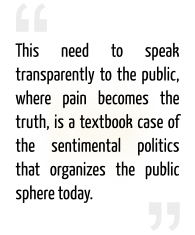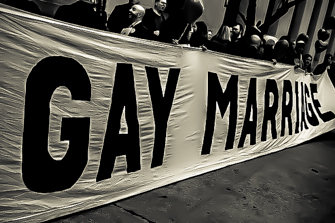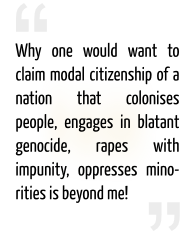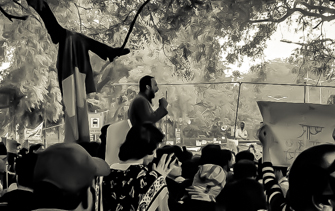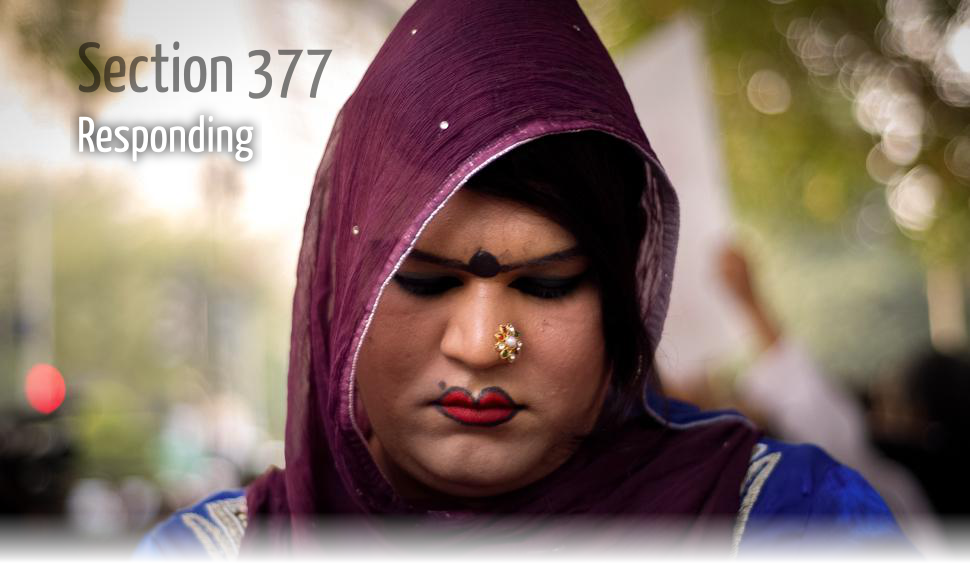
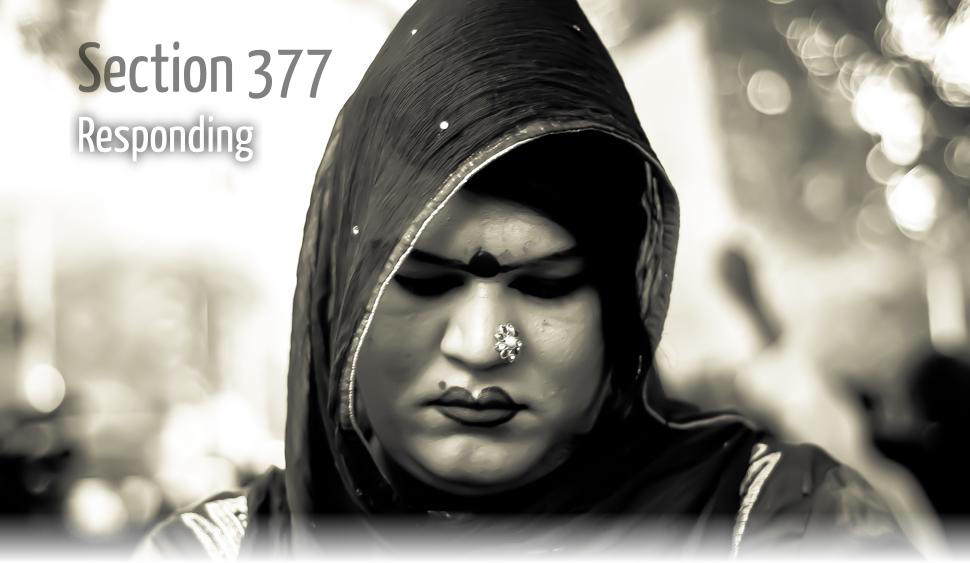
10 February 2014Back in 2009, the Delhi High Court judgement on homosexuality appeared as a promise of better days for alternative identities in India. The Supreme Court reversal of December 2013 proved that no progress is safe from any relapse. The highest judicial authority of India confirmed its decision last week, in spite of an ever-growing outcry. The LGBT-Q community is back to square one: according to Indian law, they are criminals. How can one respond to such a development? Which are the possible directions for the LGBT-Q movements in the country? In this week’s Inter-actions debate, Anjali Gopalan from Naz Foundation assesses today’s position, between growing popular tolerance and decrepit legal frameworks. She calls for a gathering of forces among minorities. In his response, Vikramaditya Sahai transcends the borders of politics: legal recognition should not be the final struggle; queers must remain resisting forces to the normative formats of citizenship. |
Hold the cursor on the illustrations to display animations and descriptions.
Engagement and UnityAnjali Gopalan |
Refusing the NormativeVikramaditya Sahai |
|
The Supreme Court judgement is also unsettling in its very form. There is something wrong with the text. The Delhi High Court judgement was exemplary, one of the best-written judgements of the last decade. Here, the text seems to have been written in a different language, and then translated badly. Simply trying to understand it is a hard task. It is even more difficult to find any inner logic or legal argument. There are talks of ‘morality’, but the undertones are religious, which is unacceptable in a secular country. And there are other absurdities: for instance, the great judges explain that there is hardly any homosexuals in this country! What we have here is a gravely lopsided judgement.
What is at fault is perhaps not the whole judiciary institution of India. It is not a monolith. We have come across lawyers and judges who are extremely empathetic. They understand our fight; they believe in human rights, in equality, in inclusiveness. In a word, they believe in our constitution. But many others have much less progressive views. The introduction of religious arguments is, for instance, a major problem. A judge cannot just say that homosexuality is immoral because religions said so. In fact, it is even against our beliefs: Hinduism never had any dictate against it! Today, even certain creeds of Christianity accept homosexuality. Religious discourse has its place, and I respect these points of view, but it should not come in the court. The law must, first, protect all individuals of the country. But would a new law bring all the expected changes in our society? In my view, law and ethics are two sides of the same coin. But they are not always in tandem. Sometimes, laws can help to change attitudes. For a long time, Sati was so widely practiced that we never thought it could be stopped. The law forbade it, and now it is quite rare. And over a period of time, people accepted that. It affects our language, too. The words the law uses are particularly important. We need to stop seeing homosexuals as “criminals” or to conflate the LGBT questions with the problem of rape. Who could do it first, if not law? This is even more decisive, because the possible political horizon could be quite unfavourable. If the BJP comes to power, it is going to be a serious issue. They have already taken a stand very much in favor of the Supreme Court decision. They have said it: they do not believe in the rights of the LGBT communities. They repeat the old rhetoric: homosexuals are not natural, not normal. If this party comes to power, the fight will be intense. But there are good signs too. The media is one place where we can see some scope of changing attitudes. The media has been very supportive of the LGBT community. Even in the Hindi language media, the coverage is positive. Thanks to this, now we see more parents of gay children coming out openly about their children. This is a great improvement. But fear remains. Still, today, we often hear: “if you legalize it, everybody may become homosexual.” This rhetoric stems from a climate of fear, of a lack of understanding. My response has always been the same: if it is difficult for a homosexual person to change her preferences, why would it be easier for an heterosexual one?
Our fight is not over, even legally. There is a legal recourse. We are filing for a curative petition. The first step will be to have the Supreme Court accepting it. But I believe that, today, we must do much more. The LGBT community must engage with good politicians. We need younger people in the political arena, in the parliament. If the average age of the politician is going to be eighty, we definitely have a problem. Younger people could bring some fresh air. If they are friends with homosexuals themselves, their perspective would be certainly different. The LGBT community must engage actively with politics, and existing political parties.
This is even more needed, because the community could gain from a more concerted methodology to counter the various attacks. The LGBT community is definitely not a monolith community, and that is a good thing. But it also has to become more coherent. One idea that seems to be emerging throughout this population is the need to form larger coalitions. The LGBT movement must work closely with the Dalit movement, with the trade union movement, with the women’s movement… This is one way to emphasize how what we ask for is a fundamental right, which is denied to us just like it is denied to other people of this country. Also, it strengthens our actions, our determination. After the recent denial of the Supreme Court, I believe that it is very important to keep the issue alive, to not get disheartened and let things slide. The environment has become more hostile; the next few years will be very hard for the community. We must engage, talk, get support from various sources. Alliances and coalitions could help in that direction.
Let us not forget that we are in India. Spain, Europe, the USA, in spite of certain conservative values, have managed to provide correct legal decisions for the LGBT. In India, the culture values family so much. If I am a gay person and I am in love with someone, I may not have the right to take care of this person I have loved and lived with. It is such a basic denial. In a society where singles or widows are criticized, social pressures are many. Even as a single man, it is not easy. For a single woman, it is hundred times worse. But if I am a gay person, it is almost as if I did not exist. My relationship does not get valued anywhere, talked about anywhere, accepted anywhere. Perhaps one should remember that what is at stake here is only decriminalization. We are not even talking about rights yet… Fundamental rights have been given to homosexuals in other countries, but in India, in 2014, we must still fight to say that we are not criminals, we are not murderers or robbers. Certainly, the law will not change everything. After the law made dowry illegal, the practice remained. But there were wide improvements too. There is a change and it is happening in front of our eyes. It is time for Indian law, now, to acknowledge it. |
Anjali’s text is at pains to convey the pain of the queer subject betrayed by the law, the subject distressed by the lack of ‘constitutional empathy’ demonstrated by the esteemed judges of the Honourable Supreme Court. Anjali uses her voice and agency to produce a transformative testimony that brims with the self-evident objectivity of the subject in pain, thus rendering her readable for others, thereby creating an intimate affective public. These gestures are repeated in the petition filed by parents of LGBT persons and sent to the court, against section 377, and in the images of the ‘sabki dadi’, the grandmother of a gay boy from Delhi who has become an icon of the pride parade through the years. 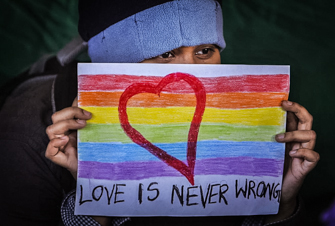 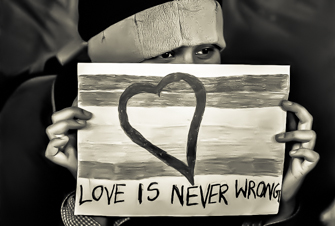 This need to speak transparently to the public, where pain becomes the truth, is a textbook case of the sentimental politics that organizes the public sphere today. It is made possible only in the present mediatized political economy, where it is hungrily devoured by the media, the same media Anjali champions. This sentimental politics reauthorizes universalist notions of citizenship in a national utopia – the law shall eradicate systemic social pain; the absence of which constituting nothing less than freedom. The law is imagined as reparative therapy to the caesura opened up in the political, by covering the wrongs in what becomes a politics of protection and rescue – one beyond ideology, beyond contestation. The Naz judgement of 2009, which let desires flow without restraints, as Anjali would have us believe, did so at the altar of privacy. In this reading of the decriminalisation, desires work against restrictions, while psychoanalysis tells us how desires work with constraints, limits and the law. Sexual privacy is drawn from a lexicon of romantic sentiment – a longing for a space where there is no trouble, where freedom and desire meet in suprapolitical expression, where the abstractness of the modal citizen is left unchanged. Against accusations that privacy is a privilege mostly for upper class gay men, some would have us believe that the judgement gave us a radical reading of privacy, as both personal and zonal. But such scholars, I think, forget how the law has its own structure. Here, for instance, the Supreme Court Judgement of 2013 was badly argued, with no trace of reasonable argument or constitutional empathy. This is what the same scholars tell us, and yet, it already affects queer lives as law. This, according to me, is one of the primary contradictions occupied by such a position – its inability to reconcile the betrayal of the law with the faith Anjali and other activists have in it.
When Anjali compares India to Spain, Europe and the US, or when she reminds us that we are in 2014 and yet the citizen-subject doesn’t have fundamental rights, she combines the above difficulty with a dangerous homonationalism steeped in the progressive teleology of development. Modernity becomes the vehicle to bring the ‘backward’ to where the liberal progressives have pedagogically and politically arrived. And more often than not, put them in their place. In a version of this politics of white women saving brown women from brown men, queer-friendly Israel justifies its occupation of Palestine, and Europe justifies its racist immigration policies.
Such a practice of othering seems endemic to the movement, but it also manifests in other spaces and in other forms. For instance, when the Press Release against the Supreme Court judgement referred to LGBT (not queer, mind you) persons as ‘they/their’. Or when, on various TV appearances, Ashok Row Kavi complained that the judgement would affect Hijras and MSMs, without ever including himself. And we are asked to build solidarities!
Perhaps, it is this difference between LGBT and queer that separates Anjali’s position from mine. Anjali wants to affirm that counter-heteronormative persons can be good, responsible Indian citizens, while for me, queer persons are, or should be, a threat to the normative – symbolized through marriage, family or the nation. Why one would want to claim modal citizenship of a nation that colonises people, engages in blatant genocide, rapes with impunity, oppresses minorities is beyond me!
Anjali and her supporters would defend their positions by responding that my talk is not practical, but academic pish-posh. In imaginings such as these, the political is confused with realpolitik and radical positions are preoccupied with strategies. However, Anjali even fails to strategize, when solidarities are suggested without discussing what they would entail, how they would be formed, why movements would come together, given that we are both aware of a history of its failure. The day the Supreme Court judgement came out, the protest against it was mere metres away from the AAP celebrations at Jantar Mantar. After the protest was over, some of us were hanging around, and we were soon approached by those who were celebrating AAP, most probably wondering why such strange (queer?) looking objects were there. One sentence down and we were attacked with the usual arguments: “natural/unnatural”, “the world would come to an end”, etc. A handful of pamphlets in support is far from equaling the generation of political discourse that AAP engendered around corruption. Let us not single out the BJP, since support has come either in a moment of political opportunism or in a demand of liberal progressivism. More than the BJP, it is homonationalist LGBT persons and allies, such as Anjali, whom I am most scared of! |
|
Anjali Gopalan is the Founder and Executive Director of The Naz Foundation (India) Trust. For more than two decades, she has been dedicating her efforts to the fight against the HIV/AIDS epidemic in India, before becoming one of the most prominent LGBT activists in the country. A recipient of the Chevalier de la Legion d’Honneur, she has been nominated and short-listed for the Nobel Peace Prize for her achievements.
|
Vikramaditya Sahai specializes on the question of queer politics for his doctoral work at Delhi University. He is generally found in seminars all over the city or at tea joints. Vikramaditya can also be spotted on routes where people are pointing at some strange object, giggling or seemingly annoyed. At present, he is negotiating the difficulty of being a feminist stalker, ever since a renowned feminist called him that.
|
Disclaimers: The opinions expressed by the writers are their own. They do not represent their institutions’ view.
LILA Inter-actions will not be responsible for the views presented.
The images and the videos used are only intended to provide multiple perspectives on the fields under discussion.
Images courtesy: Manan Vatsyayana | Daily Muslims | AFP | Bobusnr | Noah David Simon | Out and Around | Earth Rights
Share this debate… |
… follow LILA… |
||||

 The recent denial of the Supreme Court to review the judgement of December came… as no shock. The climate has not been particularly positive around our fight. But what is definitely bizarre is that the courts of this country can decriminalize homosexuality in 2009, and four years later criminalize it again. The impact of such a reversal on the lives of so many young people who had the courage to come out, is tremendous. I expect a backlash. It also has implications not just for the LGBT community, but for other minorities too. Tomorrow, one could take the same stand to question the existence of Dalits, of Christians, of disabled persons as minorities… But what frightens me the most, perhaps, is the response we will get from the police. After the 2009 judgement, they would provoke us: “Oh, so now you guys are free?” What will happen today, since the law is telling them that we are, indeed, criminals?
The recent denial of the Supreme Court to review the judgement of December came… as no shock. The climate has not been particularly positive around our fight. But what is definitely bizarre is that the courts of this country can decriminalize homosexuality in 2009, and four years later criminalize it again. The impact of such a reversal on the lives of so many young people who had the courage to come out, is tremendous. I expect a backlash. It also has implications not just for the LGBT community, but for other minorities too. Tomorrow, one could take the same stand to question the existence of Dalits, of Christians, of disabled persons as minorities… But what frightens me the most, perhaps, is the response we will get from the police. After the 2009 judgement, they would provoke us: “Oh, so now you guys are free?” What will happen today, since the law is telling them that we are, indeed, criminals?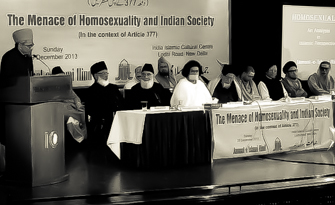
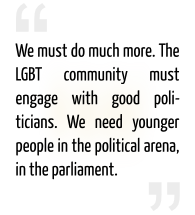
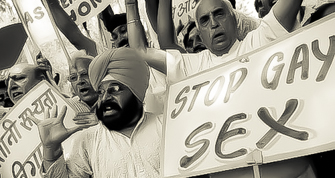
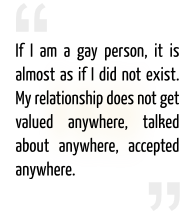
 The argument of Anjali Gopalan is symptomatic of a commonly held position around the LGBT-Q question. It is a position marred in the contradiction of occupying a queer stance – if it is queer – combined with a certain understanding of the political. The latter is defined and limited by the frameworks of citizenship, representative democracy, and the nation state as the ultimate form of political community. Thus, this response is as much about Anjali’s essay as it is about this strand of politics in general, queer or otherwise.
The argument of Anjali Gopalan is symptomatic of a commonly held position around the LGBT-Q question. It is a position marred in the contradiction of occupying a queer stance – if it is queer – combined with a certain understanding of the political. The latter is defined and limited by the frameworks of citizenship, representative democracy, and the nation state as the ultimate form of political community. Thus, this response is as much about Anjali’s essay as it is about this strand of politics in general, queer or otherwise.